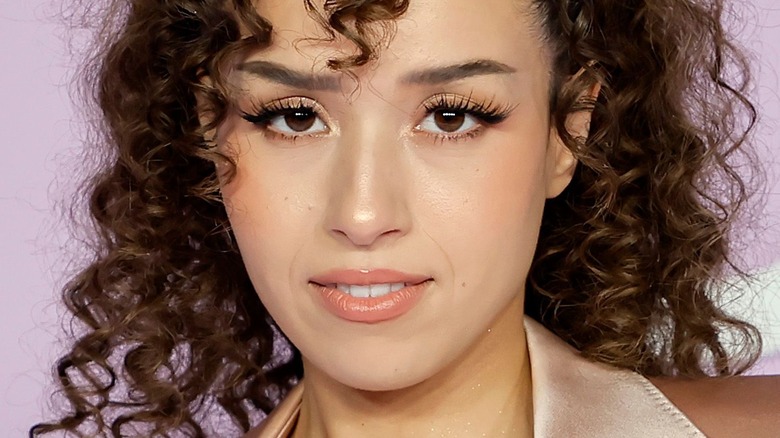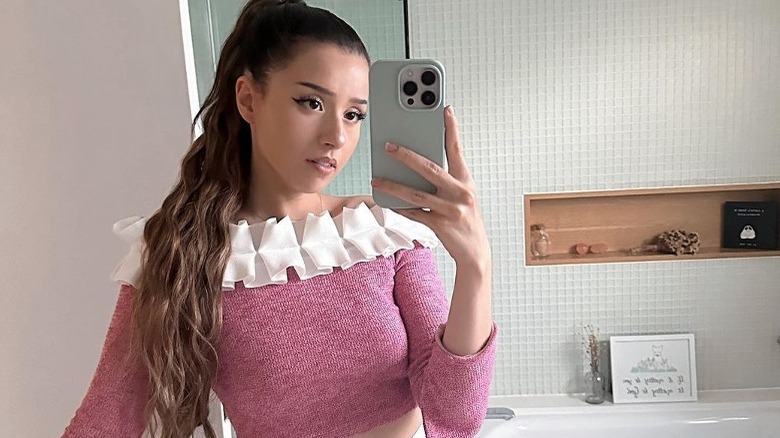Secrets The Streamer Industry Couldn't Hide Forever
Making a successful streaming career is all about building connections with an audience. The streamers who dominated in 2022 are all incredibly open with their fans, and even though they're on camera, they always try to present themselves as genuinely as possible. But even though individual careers are built on transparency and honesty, the streaming industry as a whole has plenty of secrets to hide.
From finances to personal lives, there are lots of details that streamers want to keep confidential. There are also plenty of unspoken realities in the industry, like what it actually takes to make it big or how influencers manage to present such incredibly luxurious lifestyles online. For one reason or another, there are certain aspects that streaming platforms and the people who make their careers working on them don't want viewers to know.
Pokimane recently hopped on TikTok to share some of the secrets that run rampant in streaming culture, but her big reveal is only the tip of the iceberg. Nothing stays a secret forever, so take a step behind the camera and discover all the truths that the streaming industry couldn't hide.
Streaming isn't profitable for most people
People like Pokimane or Fuslie have had their lives utterly changed by streaming. They've found career opportunities, met friends, and built an audience of dedicated fans. They're able to devote so much of their time to content creation because it's their job. What's even better is that it pays more than the average day job.
Most people don't have that kind of experience with streaming. Forget making it big and getting rich as a streamer – only the top 0.015% of Twitch streamers even earn the median US income. That's better than the odds of winning the lottery, but the numbers aren't good enough for streaming to be considered a reliable career path. The vast majority of individuals who are "in the streaming industry" don't earn any money at all from the work they do.
What is it like to stream to an empty chat night after night, for months or even years on end? Some low-viewer streamers told The Verge that the experience can be isolating and demoralizing, but it's not without its upsides. "Streaming has made me more interesting, more quick-witted, more outgoing, and extroverted," said MaverickRPDM. Performing in the hope of getting an audience can help some people become more comfortable with letting their personality shine through in real-life interactions, and occasionally the reward of having just one or two viewers is enough to keep people coming back to Twitch and other platforms.
Twitch couldn't keep its contracts secret
Twitch itself has had a volatile couple of years. In October 2021 the company suffered a massive leak that gave hackers access to huge swaths of private information. One of the biggest pieces of data that got exposed was exactly how much money the highest earners on Twitch were making and how much revenue Twitch was getting as part of its cut. Some of the top streamers were raking in millions of dollars from Twitch alone, and most, but not all, of those streamers were giving the company 50% of what they made.
That leak might have served as a motivating factor for Twitch making adjustments to its contracts while also becoming more transparent with the deals it offers streamers. In September 2022 Twitch President Dan Clancy made an announcement about big changes coming to the platform. Clancy revealed that Twitch had privately given some streamers a 70/30 revenue split, but he said that the criteria for handing out that better deal was largely undefined. Going forward, Twitch would only offer 50/50 splits, and the company would put forward a slightly better split on ad revenue to encourage streamers to run more ads for their viewers. The announcement received a mixed reception at best, but it marked the end of Twitch being able to keep the terms of its contracts top secret.
Crypto scams are around every corner
Anyone who's had an internet connection in the past three years has stumbled into one conversation or another about cryptocurrency and NFTs. Seemingly everyone has a new coin or blockchain idea that they imagine will change the world, or at the very least make them a ton of money. What started as a niche tech trend has exploded across industries, and it's even made its way into gaming. Streamers like Dr Disrespect have voiced their opinions about blockchain games, and some genuinely believe that this new technology can make gaming better than ever.
Unfortunately, for every person who wants to use crypto to improve the world, there are several more who just want to make a buck, and they don't care who it affects. Ice Poseidon is a streamer who's no stranger to controversy, but his $500,000 crypto scheme took things to another level. He created CxCoin and convinced his fans to buy in, promising that he had long-term plans for the project. Instead, he took their money and ran.
Ice Poseidon is far from alone. In the summer of 2021, FaZe Clan had to take serious action after several of its members were involved in a pump-and-dump crypto scam. They announced on Twitter that Kay had been removed from the group and Jarvis, Nikan, and Teeqo had been suspended after they promoted a new crypto coin that only existed to take money from viewers.
Streamers let slip how much their sponsorships pay out
Everyone knows that streamers make a significant portion of their income through sponsorships. Companies pay streamers to use specific gear, wear certain clothes, or explicitly talk about their products. It all comes with the territory, but in general, streamers don't reveal how much companies are willing to pay them. Sometimes streamers want to keep their income private, and very often keeping the numbers a secret is part of their sponsorship deal.
Every once in a while fans get an accidental peek behind the scenes and find out just how much money their favorite streamers bring in on various deals. In March 2022, Adin Ross – who's since been permanently banned from Twitch – accidentally opened a Discord conversation between himself and a gambling sponsor live on stream. Ross's fans discovered that he was making roughly $4 million a month from just one sponsorship deal.
Ross's earnings were above and beyond what most streamers are making, but he's not the only person who's slipped up and leaked his own income live on stream. In February 2023, OTK member Tectone accidentally let an email notification show up on stream. It revealed that he'd been paid $35,000 to host a "Lost Ark" sponsored stream. It's not necessarily controversial for streamers to take sponsorship deals, but it's always interesting for fans to see how the sausage gets made.
Some influencers rent their clothes
Influencers do their best to make their lives look as glamorous as possible online. Part of that means making sure that they're always on top of the latest fashion before posting another vacation selfie. In a TikTok video, Pokimane got real with her fans about influencer culture, and she made a big reveal about how people are able to consistently post pictures of themselves wearing brand-new designer clothing.
According to Pokimane, plenty of influencers rent their clothes. They get just what they need for their next photo shoot and pay way less than the retail price because as soon as they're done wearing it they have to send it back. Pokimane said that this particular industry secret can be a real problem because people who want to become influencers think they need to go out and buy all these expensive clothes themselves. Some people sink a bunch of money into designer clothes without ever realizing that established influencers don't have to do that.
Pokimane may just be one source, but it's easy to see that she's telling the truth. In fact, clothing rental for influencers has become so popular that there are entire brands dedicated just to providing that service. Now that aspiring influencers are in the know, they can save some cash while looking just as good as their role models.
Content creators fake relationships
In her TikTok video, Pokimane also dropped a major bombshell about streamer relationships: sometimes they're fake. Fans tend to form intense bonds with their favorite streamers, and it's not uncommon for them to become invested in a streamer's love life. Influencers know this, and some take advantage of it, faking relationships for viewers. "That's why sometimes when you hear 'oh someone cheated on someone' it's not cheating," Pokimane said. "They're just not really together." She said in her experience this happens with YouTuber couples more than couples on other platforms, and not everyone is faking their romance for engagement, but it does happen.
Some YouTube fans might remember when Jake Paul and Tana Mongeau got together back in 2019. Fans spent months wondering about the status of their relationship after Mongeau made a Snapchat post that hinted at her being with Paul, and eventually they announced their wedding. The ceremony itself, which wasn't legally binding, had all the makings of great internet content, but even though everything was obviously staged, people still tuned in. Maybe fans don't care whether or not relationships are genuine, as long as they provide a healthy amount of spectacle before the inevitable breakup.
Some streamers fake not being in a relationship
While some streamers find that faking a relationship helps them get more viewers, others find the exact opposite to be true. "I notice that when I'm single, viewers are much more interested in my life and things that are going on with me," content creator Cahlaflour told The Verge. She and many other female streamers said that they notice an influx of attention when their viewers think that they aren't in a relationship. That attention isn't always the kind of engagement that streamers actually want, though. "I was getting way more people trying to reach out in DM's and even had an ex-moderator of mine that started trying to dig into my personal life," said Cahlaflour.
Famously, Amouranth's fans didn't know she was in a relationship until she revealed she was in an abusive marriage. She admitted that she had wanted to be open about her relationship, but her husband wouldn't let her. He thought that if people knew she was married, she'd make less money from her content creation work. The fact that so many streamers feel the need to fake their relationships, one way or another, says a lot about the most problematic dynamics between streamers and their fans.
Content houses aren't dream homes
Aside from being geared toward content creation, what do groups like AMP, OTK, and 100 Thieves all have in common? They've all had members spend at least some time living together in a content house. On the surface, having one house serve as the headquarters of an organization sounds like a dream. Fans watch the videos that come out of these setups and wish that they could have a similar experience living with their friends and making videos for a living.
In reality, residing in a content house is pretty far from living the dream. For one thing, when a group of streamers lives together, cleaning the house can inadvertently fall pretty low on the to-do list. "When it comes to cleanliness, after being in, like, content houses for four years, my standards are on the ground," Pokimane admitted in an interview. There's also always a chance that someone's latest video idea takes things way too far. Kai Cenat revealed that AMP lost its first content house after trying to have a fireworks battle indoors.
Not all the downsides to living in a content house are as straightforward as dirty communal spaces or as dangerous as potentially burning the place to the ground. Valkyrae moved out of the 100 Thieves house back in 2020, and she told her fans it was because "I wanted to separate my work life from my at-home life." Everyone needs a space to relax and unwind, and content houses don't exactly provide that.
Streaming can be physically dangerous
Being a content creator probably sounds like a lax job. What could be easier than goofing off with your friends on camera, or playing video games for hours on end while thousands of people watch? There are definitely much harder jobs out there, but at the same time, streaming is definitely more dangerous than viewers realize. There are some dangers everyone already knows about. Streamers occasionally deal with stalkers or toxic fans swatting their homes. Those get the most attention, but the biggest danger with streaming is something that few people talk about.
It turns out a lot can go wrong just by sitting in front of the computer for hours on end. The human body is meant to move, and streamers can end up suffering severe injuries because they spent too much time in their favorite gaming chair. People usually associate too much keyboard time with developing carpal tunnel syndrome, but tendinopathy – damaged mobility or outright scarring – in arm tendons is even more common. To avoid permanent impacts on their muscles, streamers need to step away from the screen and move regularly, but that's hard to do when you're trying to keep an audience engaged every single minute you're working. Just how hard streaming can be on your body might be the biggest secret in the industry.










